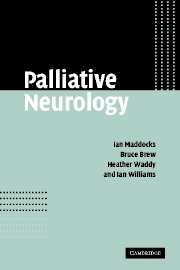Book contents
- Frontmatter
- Contents
- Foreword
- Note on drugs and abbreviations
- Section I Palliative Management
- Section II Major discomforts in advanced neurological illness
- 1 Fatigue
- 2 Problems with muscles and movement
- 3 Bulbar symptoms
- 4 Respiratory symptoms
- 5 Gastrointestinal symptoms
- 6 Urological symptoms
- 7 Pain
- 8 Cognitive, behavioural and psychological symptoms
- 9 Miscellaneous symptoms
- Section III Major neurological conditions requiring palliation
- Section IV Ethical issues
- Section V Appendices
- Index
9 - Miscellaneous symptoms
from Section II - Major discomforts in advanced neurological illness
Published online by Cambridge University Press: 08 January 2010
- Frontmatter
- Contents
- Foreword
- Note on drugs and abbreviations
- Section I Palliative Management
- Section II Major discomforts in advanced neurological illness
- 1 Fatigue
- 2 Problems with muscles and movement
- 3 Bulbar symptoms
- 4 Respiratory symptoms
- 5 Gastrointestinal symptoms
- 6 Urological symptoms
- 7 Pain
- 8 Cognitive, behavioural and psychological symptoms
- 9 Miscellaneous symptoms
- Section III Major neurological conditions requiring palliation
- Section IV Ethical issues
- Section V Appendices
- Index
Summary
TEMPERATURE CONTROL AND PYREXIA
Fever is a complex physiological response triggered by infectious or septic stimuli. Elevations in body temperature occur when concentrations of prostaglandin E(2) (PGE(2)) increase within certain areas of the brain. These elevations alter the firing rate of neurons that control thermoregulation in the hypothalamus. Although fever benefits the non-specific immune response to invading microorganisms, it is also viewed as a source of discomfort and is commonly suppressed with antipyretic medication.
Antipyretics such as aspirin work by inhibiting the enzyme cyclooxygenase and reducing the levels of PGE(2) within the hypothalamus. They may also reduce pro-inflammatory mediators, enhance anti-inflammatory signals at sites of injury, or boost antipyretic messages within the brain.
In polyneuropathy (e.g. type 2 diabetes mellitus), the ability of skin blood vessels to dilate is impaired. This impaired vasodilatation leads to an increased risk of heat illness during exposure to elevated ambient temperatures.
Ageing alters physiological responses to cold stress and heat stress, and responses alter further, depending on fitness level and the effects of chronic disease that may change the normal mechanisms of peripheral vaso-constriction, cold-induced metabolic heat production, sweating and cardiovascular function.
SWEATING (HYPERHIDROSIS)
More than one-half of patients with Parkinson's disease complain of sweating disturbances that are not correlated with disease severity, but do match other symptoms of autonomic dysfunction. They report physical, social and emotional impairments due to sweating that relate mainly to autonomic dysfunction, ‘off periods’ and dyskinesia.
- Type
- Chapter
- Information
- Palliative Neurology , pp. 120 - 124Publisher: Cambridge University PressPrint publication year: 2005



